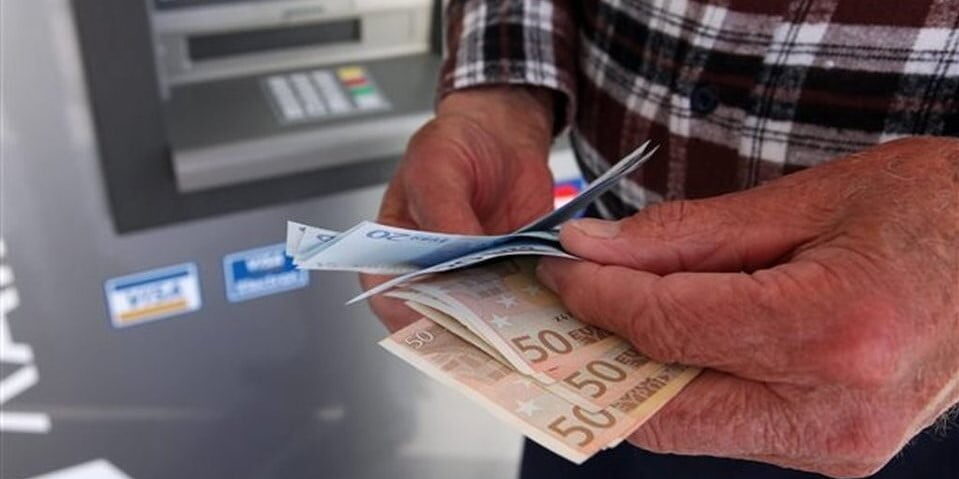
It is expected that new regulations will be stipulated in the draft pension law, with a special category of beneficiaries receiving monthly salaries of up to 470 euros. Who cares?
Even the 470 euros will be able to reach the amounts that will be received on hand (40% of the earnings included in the pension calculation) by 150 thousand debtors with debts of up to 30 thousand euros to the pension fund. EFKAWhich will be organized according to what is stipulated in the draft insurance law that will be discussed during the week in the Council of Ministers and is expected to be put forward for consultation after that.
Pensions: a new model in employing retirees
The draft law introduces a new model for employing pensioners, expands the debt ceiling and allows debtors aged 67 and over to retire, changes the conditions for granting supplementary pensions with a minimum return of 15 years (or 4,500 marks) and improves the role of professional funds that will be able to grant pensions or lump sums each year. 10 years insurance.
Pensions: These are the new arrangements set out in the draft law
In detail, the draft law will stipulate the following seven regulations:
1 Debt-ridden pensions: Debtors with debts of up to €30,000 to the EFKA and up to €10,000 from farmers will be able to retire, provided that 60% of the pension is withheld until the debt is reduced to €20,000. After this period, the installment will be reduced to EFKA (€20,000) with the aim of paying off the rest of the debt in 60 monthly installments8 (5 years). For approval of debts and settlement, there will be a special platform, through which checks and comparison of bank deposits of debtors will be carried out. As long as these funds are less than €12,000, the process will continue. The beneficiary will receive 40% of the amount, while the remaining 60% will be withheld until the debt decreases to 20,000 euros. If the debtor reaches the age of 67 and has a debt of €30,000, he will have €470 on hand (€98 repayment and €371.7 with 15 years). This pensioner will receive 200 euros per month for 3.5 years until the debt is paid down to 20,000 euros. If the debtor owes €30,000 and has insurance for 40 years, he will receive a pension of €820 and for 24 months will receive a pension of €415 per month.
2. Employment of pensioners: Retired employees will be charged a 10% contribution to the EFKA and self-employed and self-employed workers will be charged 50% of their chosen insurance category (mainly the first, where 88% of the insured are and will pay €115). Self-employed people who also have supplementary insurance will be charged a fee of 4%. The deduction in favor of the EFKA (10%) will be paid by every employed employee whose employment income does not exceed 12 times the national pension (413 euros), i.e. 4965 euros. With the new system, retirees will receive 100% of the pension, which is useful for declaring work, as they will receive a benefit of 1,200 to 2,500 euros and at the same time the working time will be counted as an increase in the pension. The pension will be paid from 1/1/2024 in full, as the 30% reduction will be abolished from 2020 (Frutsis Law).
3 Additional Pension: There will be uniform conditions across all funds for granting additional pension within 3 months after the grant of the main pension and a minimum of 4,500 formalities, which currently applies only to the former IKA-ETAM. This will unblock the supplementary pension in 60,000 outstanding state pensions and DEKO-insured persons, for whom there will be no need to complete 25 years and 35 years. These cases received the supplementary pension at the age of 67 years.
4 Occupational funds: Emphasis is placed on facilitating the establishment of multi-employer occupational funds, introducing good management practices, strengthening the supervision of funds, but also “rationalizing” their taxation. Taxes will be linked to how quickly someone withdraws from the occupational fund into a pension and whether they choose a life annuity or a lump sum. In the pension, taxes will be from 5% for more than 20 years of insurance, 10% for 10 years and 7.5% for 60% of the pension will be withheld from debtors with debts of up to €30,000 (up to €10,000 for farmers) To the EFKA, until the debt is limited to €20,000, the EFKA contribution of 10% will now be charged to retired employees, instead of a 30% deduction from the pension 4500 represents the common condition in all funds to grant the supplementary pension 9 months from 4 today, a bonus will be granted Motherhood for self-employed women and farmers aged 15-20 years. The tax is the same if the insured wishes to receive the amount in one lump sum. It will escalate from 20% for 10 years, 15% for 15-20 years, and 10% for 20 years or more. For TEA retirement, retirement at 10-15 years of insurance will be provided from year 55 to 62 or at 67.
5. Widows’ pensions: Aligning the insurance system in the private sector with widows’ pensions in state allocations. In cases where someone receives two pensions, they have to choose which one will be reduced to 50%.
6 Prepaid card: This applies to OPCA benefits, and the beneficiary will be able to receive half the amount in cash.
7 Maternity benefit: The benefit extends to self-employed women and farmers from 4 to 9 months.
Read also:

“Avid problem solver. Extreme social media junkie. Beer buff. Coffee guru. Internet geek. Travel ninja.”





More Stories
An unpleasant development with all aircraft: and in Greece – what will happen in May
Look how they trampled on her like that..
Retrospective for retirees: Who is affected, who wins and who loses – Newsbomb – News